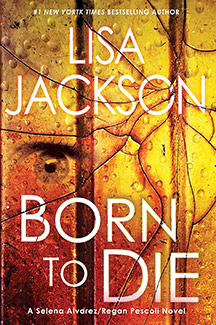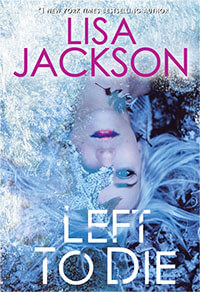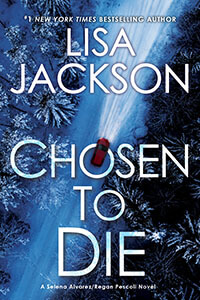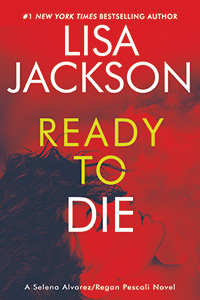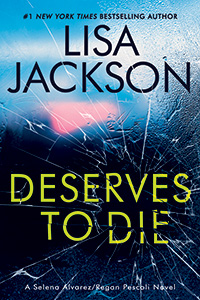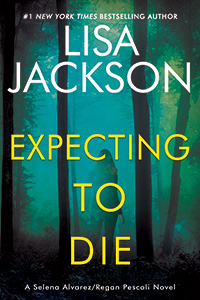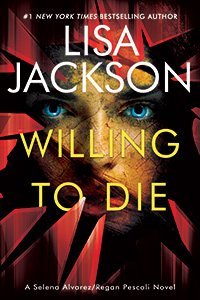The resemblance between Dr. Kacey Lambert and B-movie actress Shelly Bonaventure is a standing joke in the town of Grizzly Falls, Montana. So much so, that Kacey is momentarily shocked to read about the fading starlet’s death. Still, it’s not as if there was any real connection between them. And when a fatally injured jogger who also bears a striking similarity to Kacey is rushed into the ER days later, Kacey is ready to rule it another sad, strange accident. Detective Selena Alvarez suspects otherwise. An autopsy confirms that the jogger had traces of poison in her blood at the time of her death. Selena and her partner, Regan Pescoli, can find no motive for the murder. But Kacey has started to notice ties between the dead women’s lives and her own—all close in age, born within miles of each other—and all with ties to the man Kacey has just begun seeing, single father Trace O’Halleran. Now, with more look-alikes dying, Kacey must question her judgment, her safety—and everything she’s ever believed about her past. The deeper Kacey digs, the more reason she has to fear. The body count is rising, the killer is getting bolder and more brutal. And Kacey knows it’s only a matter of time before hers is the next name on a list of those who were born to die…
Born To Die
Part of the Montana “To Die” Series – Book 3
| Publish Date | July 2011 |
|---|---|
| Publisher | Zebra |
| ISBN | 1420102788 |
Prologue
Sometimes you win; sometimes you lose.
Tonight, Shelly Bonaventure thought, she’d come out the loser. Make that a loser with a capital “L”; the kind kids made with their thumb and forefinger held up to their foreheads.
She unlocked the door of her apartment, threw her purse onto the entry-way table and felt a sudden, searing pain scream through her guts.
Gasping, she doubled over, her insides on fire.
Suddenly.
Out of the blue.
“Oooh,” she moaned as the pain subsided enough that she could stumble to the couch. “What the hell?”
Still queasy, the pain in her abdomen slightly lessened she took in several deep breaths. Was the pain bad enough to call 9-1-1 or should she head to the ER herself?
“Don’t be silly,” she whispered, but an uneasy feeling that something was very, very wrong stuck with her. “Pull yourself together,” she said and kicked off her high heels. Either she’d drunk too much, eaten the wrong thing or her period was coming a few days early.
No way. Not with pain like that.
She closed her eyes for a second, beads of perspiration collecting on her upper lip. She would take some Pepto if she had it and if not, just suffer through until morning. As she swiped at the sweat, she glanced around for her cat. “Lana?” she said and heard no response. Odd. The cat usually trotted out of whatever hiding spot she’d claimed when she heard the front door’s lock spring open.
Huh.
“Lana? Come on kitty . . .” Again she listened; again she heard nothing. Oh, well, maybe the calico was just playing games with her and would spring out from a darkened hallway to scare the liver out of Shelly. It had happened before.
Yet . . .
Slowly she made her way to the bathroom, nearly tripping on the rug she’d bought . . . Oh, God, had it really been seven years ago. “Come out, come out wherever you are?” she sing-songed to the cat. “Momma’s home.”
Clunk!
The sound came from the patio.
Startled, Shelly whirled.
Was there a shadow on the patio?
Oh, God. Heart in her throat, she stepped forward and peered through the sliding door where she saw that the shadow was only that of a palm frond catching in the wind and dancing in front of the porch light.
“Idiot! Stop being paranoid.”
So what was the noise . . . ?
The cat? Where?
Her nerves still stretched a bit, Shelly convinced herself it was nothing. Probably the old guy in the unit above hers, Bob Whatever. He was always dropping something.
Another wave of nausea swept through her and she clenched her teeth until the pain subsided. God, what was wrong with her?
She held onto the back of the couch, let out her breath, then glanced around the living area. Had she lived in this one-bedroom apartment for nearly a decade, watching as the years tumbled past, the lines in her face became more pronounced and the roles she’d hoped to land slipped through her fingers?
Ever since her divorce from Cameron . . .
She wasn’t going to dwell on that piece of ancient history. Not tonight. A positive attitude, that’s what she needed. And maybe something to calm her stomach. She’d just had a little too much to drink at Lizards, the bar, named more for its clientele than any real reptile that was less than two blocks down the street. Cutting loose, telling herself she was going to embrace the big 3-5 that was bearing down on her, she’d overindulged.
But just a bit.
Right?
How could she help it, when the guy she’d met had heard about her birthday, then bought her several mai-tais and had seemed really interested? Really interested. He’d been handsome and sexy and spoke in a voice so low it caused her spine to tingle a bit. He’d almost seemed familiar and when he’d touched the back of her hand, she’d experienced a definite tingle of anticipation. His gray eyes had been intense, striated a deep, midnight blue, his lips blade thin, the slight shading of his jaw only emphasizing how male he’d been. And then that smile, crooked and most definitely sexy as he’d talked to her. Yeah, he definitely had the bad boy routine down pat. She’d even mentioned to him that he had a killer smile and he’d found that comment amusing. He’d said he’d never heard of it described that way and chuckled deep in his throat.
She’d had fantasies of what he would look like without his shirt, how it would feel to have his lips press hot and urgent against hers, how she would tumble oh, so easily into bed with him as his strong arms caught her.
Yeah, but you left him in the bar, didn’t you?
To come back here. Alone.
Of course she’d walked away. She didn’t know him from Adam. And getting out when she did was probably a good idea, really, considering the fact that she was feeling ill and had a five o’clock wake up call that she wasn’t about to miss.
Her agent had weaseled an audition for a role on a new drama to be aired on Fox in the fall. The casting call was being held early tomorrow and she intended to look her best. Better than her best. Because if she didn’t land this role, it was over . . . well at least until she wangled her way onto Dancing With The Stars or some other reality-vehicle that would help jump start her flagging career.
If she could just shake this lousy feeling. Good lord, was she actually perspiring? That wasn’t good; not good at all.
After all, this television series could be her last shot, considering Hollywood’s attitude about age.
How depressing was that?
Shelly Bonaventure had to make it, she had to. She couldn’t very well go back to that podunk town in Montana with her tail between her legs? Hadn’t she been prom queen of Sycamore High, voted “Most Likely To Be Famous” her senior year? Hadn’t she taken off, shaking the dust of that small town from her shoes as quickly as possible? And hadn’t, in the beginning her star shined brightly, rising with promise and a few plum roles? A recurring role in a soap opera before she was twenty! Hadn’t she worked with the Tom’s–-Cruise and Hanks–and Gwyneth and Meryl and . . . and even Brad Friggin’ Pitt? Okay, so they were small parts, but still, they were legit! And she’d been a double for Julia Roberts! Then there was the vampire series What’s Blood Got to Do With It, on cable. She’d paid her dues, by God. But, she realized, those flashes of fame had been a while back and lately she’d been relegated to corpses on C.S.I., a few commercials and voice-overs for low-budget animated films.
If she didn’t land the part of Estelle in that new series, she could kiss her B-listed career good-bye and open her arms to a reality show for has-beens. She shuddered at the thought.
Hollywood, she thought miserably, the land of worn out casting couches and broken dreams.
She winced against another jab of pain that nearly buckled her knees. “Sweet Jesus,” she whispered, then half-crawled to her small galley kitchen where she opened her refrigerator, saw the sparse contents inside and felt depressed all over again. After retrieving the half full bottle of Pepto, she unscrewed the cap and took a swallow of the pink ooze. Shuddering, she replaced the top and put the remainder of the bottle back on the shelf, then sat on the floor, her legs extended as she took in long, deep breaths.
God, she felt bad.
Maybe she should call her doctor, at least leave a message with his answering service. Slowly, she pulled herself to her feet and wondered, again, where was Lana?
Well, certainly not on the counter where three days worth of coffee cups, dirty glasses and Lean Cuisine trays littered the chipped tile.
Her stomach still aching, she made her way to the bathroom, told herself she couldn’t let this town beat her down.
Hadn’t she suffered through bulimia?
Hadn’t she done whatever it took?
And even if she wasn’t classically beautiful, she’d been told her face had “character” and “intelligence”. Her auburn hair was still vibrant, the skin around her green eyes and full lips without too many tell-tale lines.
With a glance in the mirror over the sink she cringed as she wedged herself into the tiny bathroom. Despite the pep talk to herself, the years were beginning to show, if only a little. She used a ton of products to keep her complexion flawless and she wasn’t into Botox. Yet. Though she wasn’t ruling it out. Then again, she wouldn’t rule anything out that might force Father Time back a step or two.
But he was a persistent son of a bitch, she thought and pushed the flesh on the sides of her jaw backward in an attempt to see if she really needed to be “tightened up.”
Not yet, thank God. She didn’t have the money for any kind of “work.” And she wasn’t ready to write some kind of trumped up tell-all book her agent had mentioned. She wasn’t even thirty-five yet, for Gods sake, at least not for a few more days; she wasn’t ready to spill her guts. And truth to tell, she didn’t have that much to write about; her life had been pretty dull compared to a lot of her peers.
Noticing the whites of her eyes were a little bloodshot, she removed her contacts, then found the bottle of Visine she kept in the medicine cabinet. After unscrewing the bottle cap, she tilted her head back, blinked in the drops and resealed the bottle. She closed the mirrored front of the cabinet and caught a glimpse of a shadow behind her.
What?
Her heart clutched and she turned. The room was empty, the door behind her open to the living room and the sliding door to her patio.
Her flesh prickled.
“Lana? Is that you?” she called as she stepped into the living area again, the edges of her room blurry from her myopia and the drops that hadn’t quite settled. “Kitty?” Where was the damned cat, a calico she’d named after her favorite movie icon? “Come out, come out, wherever you are,” she sang, but decided the cat who often played a game of hide and seek, was lurking in the shadows somewhere, ready to pounce. More than once, Lana, leaping from behind the framed pictures set upon the book case, scattering the photos, breaking the glass and, plumped up to twice her size, had startled Shelly. Scaring her was the cat’s favorite pastime. “Here kitty, kitty . . .”
True to her independent temperament, Lana didn’t appear.
Shelly stood barefoot in the living room. There was something about the apartment, a stillness that suggested no one, not even the cat was inside.
Which didn’t make sense.
Shelly had left Lana sleeping on the back of the couch when she’d gone out earlier. She was certain of it and remembered the cat only flicking her tail as she lay curled in the soft cushions.
So why did it feel as if the rooms were empty, devoid of life? She heard dry leaves skittering across the patio, bits of brown and rust dancing eerily.
For the love of God, what was wrong with her. It was just the wind, nothing more than dead leaves for crying out loud. Still the hairs on the back of her arm lifted.
“Oh, get over your bad self!”
Another sharp cramp to her mid section. “Ooh.” She doubled over, the pain intense. “For the love of God!” This time she didn’t wait. She crab-walked to her purse and fumbled for her cell phone.
The damned thing wasn’t in its usual pocket. “Come on, come on!” This was no time for the phone to be missing. Fingers shaking, she fished through the interior of the purse, then as the pain increased, dumped the contents onto the tile floor. Keys, eyeglass case, wallet, receipts, coins, pack of cigarettes, tampon holder and her tiny canister of pepper spray went skittering across the tile.
No phone.
What?
She’d had her cell at the bar. She remembered turning it to vibrate and . . . hadn’t she shoved it back into her purse? Or had she left it at Lizards, on the top of the sleek counter that was fashioned to look like snake skin?
“Oh, God,” she whispered, sweat breaking out on her forehead, her pulse jumping. She didn’t have a land line; there was no way to call for help except for–
Sccrrraape!
The dry, rasping sound seemed to echo through her head.
What the hell was that?
The cat?
Lana?” she said nervously and noticed the slider door was open, just the tiniest of cracks.
Hadn’t it been shut?
Absolutely. She remembered sliding it closed, though of course it didn’t latch because that stupid super, Merlin, hadn’t gotten around to fixing it.
Oh, Jesus! Her scalp prickled and her heart began to knock, though she told herself she was being paranoid. No one was in the apartment, lurking inside, lying in wait for her. You’ve been auditioning for too many victims in those cheap horror flicks.
Still . . .
Ears straining, heart thudding, she looked at her bedroom door, open just a crack. She took two steps in the direction of the open door when, from the corner of her eye, she saw movement, a dark figure at the edge of the slider, on the other side of the glass.
An intruder! Oh, no!
“Wha–?” She opened her mouth to scream.
Then stopped when she recognized the guy from the bar. In his hand was her cell phone. “Oh, God, you scared me half to death!” she said as she pushed the door open. “How’d you get my–?”
But she knew, before he said, “You left it on the bar.”
“So how did you find me?”
Again the slow, crooked grin. “Your address is in the contact information. Under home.”
“Oh. Yeah.”
He really was a heart-stopper with that square jaw, dark hair and eyes that showed a bit of the devil in their blue depths.
“Most people come to the front door and knock.” She couldn’t help but be a little irritated. Besides she felt like hell.
His lips twitched. “Maybe I’m not most people.”
She couldn’t argue that and wasn’t about to try when another pain, sharp enough that she had to double over, cut through her. “Oh . . . oh . . . Geez.” She placed a hand over the top of her glass topped table and sucked in her breath. Again she was perspiring, this time feeling a little faint.
“Hey! Are you okay?”
“No.” She was shaking her head. “You’d better leave. I’m sorry—–oh!” She sucked in her breath. This time her knees buckled and he caught her, strong arms surrounding her.
“You need help.”
“I–” Before she could protest, he picked her up and carried her unerringly to the bedroom.
“Hey, wait a second . . .”
“Just lie down,” he said calmly.
She didn’t have a choice. The bedroom was spinning, the bedside lamp seeming to swirl in front of her eyes. Man, she was sick . . . oh, wait . . . a new panic rose in her as he lay her on the mussed bedcovers. The mattress gave slightly with her weight.
“I don’t think–” He left her for a second and she thought about trying to escape. Something about his appearance at her back door was all wrong. She knew it now, despite the agony roiling through her insides. Her meeting him at the bar, the illness, him showing up on her patio . . .
Jesus, had he turned on the shower? She heard the rush of water and a creak as the old pipes were shut off. What was that all about?
Before she could move, he was back, holding her cell phone out to her. “I’ve already called 9-1-1,” he said and she tried to reach for the phone, but couldn’t. She tried to force her arm upward, but her fingers were limp and useless as her arm flopped back onto the mattress.
Oh, God, oh, God, she had to get away . . . this was sooo wrong.
He set the cell next to her face on the quilt her grandmother had pieced for her when she was ten . . .
From the bed with its tangle of blankets and sheets, she looked up at him and saw him grin again, and this time she was certain there was no mirth in his smile, just a cold, deadly satisfaction. His once handsome face now appearing demonic.
“Oh, God, what did you do?” she tried to say though the words were barely intelligible.
“Sweet dreams.” He walked to the doorway and paused and she felt a chill as cold as death.
“Nine-one-one,” a female voice said crisply from the phone. “Please state your name and emergen–”
“Help,” Shelly cried frantically, her voice the barest of whispers. Her mouth wouldn’t work, her tongue thick and unresponsive.
“Pardon me?”
“I need help,” she tried to say more loudly, but the words were garbled, even to her own ears.
“I’m sorry, I can’t hear you. Please speak up. What is the nature of your emergency?”
Help me, please! Send someone! Shelly tried to say, now in a full-blown panic. Oh, God, help me! The room was swimming around her, the words she wanted to cry out were trapped in her mind. The phone fell from her fingers, to slide off the bed and land on the floor.
Her head lolled to one side, but she saw him standing in the doorway, staring back at her. The “killer” smile had slid from his face and he glared at her with pure, undisguised hatred.
Why? Why me?
Evil glinted in the eyes she’d found so intriguing just hours before.
She knew in the few last moments of her life that her death hadn’t been random; for some God-forsaken reason, he had targeted her. Theirs hadn’t been a chance meeting in the bar.
God help me, she thought a tear rolling from her eye, the certainty of death dawning. From the doorway, the mysterious stranger with his disturbing smile stared at her as she drew in a slow, shallow breath.
A voice was squawking from the phone on the floor but it seemed distant, a million miles away. She watched as he came closer again and placed the vial of pills at her bedside. Then, while staring into her eyes, telling her silently that he was the cause of her death, he slowly and methodically began stripping her of her clothes . . .
Chapter One
Balancing a cup of coffee and a chocolate macadamia nut cookie from Joltz, the local coffee shop, in on hand and the case holding her laptop in the other, Dr. Acacia “Kacey” Lambert hurried along the sidewalk. Though it was nearly dawn, streetlights glowed, Christmas lights were strung and burning bright as they danced in the icy November wind that whistled through the small town of Grizzly Falls.
Winter had come early this year and with a gale force, bringing early snow and ice that was causing all kinds of electrical outages and traffic problems.
Just as it had a year earlier, she thought.
So much for global warming!
A steady stream of cars, this part of Montana’s rush hour, was cutting through the surface streets on the way to the highway as people headed for work. Pedestrians in thick jackets, scarfs, wool hats and boots walked briskly past, their breaths fogging, their cheeks red from the cold.
Winters here were harsh, much more frigid than they had been in Seattle, but she loved this part of the country and didn’t regret moving back to the small town where she’d grown up for a second.
At the clinic, located on the lower part of the town, a few blocks from the courthouse and the river, she juggled her keys and unlocked the front door. Another blast of winter air cut through her down jacket as it raced through the river’s chasm, rattling storefronts.
Colder than a witch’s teat. Or so her grandfather would have said. Alfred Lambert, eyes a mischievous blue behind wire-rimmed glasses had never given up his salty language, though his wife Bess had forever reprimanded him.
God, she still missed them both. Sometimes achingly so. She lived in the farmhouse where they’d spent over fifty years together and, consequently thought of them often.
A truck rolled by and despite the cold, the passenger window was rolled down a bit, and the nose of a hound of some kind poking out, the strains of Jingle Bell Rock audible.
“Still too early,” she muttered as the door unlocked and she slipped into the empty reception area of the low-slung building that housed one of only two clinics in town. A row of slightly worn chairs rimmed the walls, magazines were placed on the scattered tables, a dying palm of some kind filled a corner and there were a few toys for the little ones stacked neatly near the reception window.
Lights were glowing from behind a wall of glass and Heather Ramsey, the receptionist, was already planted at the long counter that served as her desk on the other side of the window. Nose to computer monitor screen, Heather was rapt, her eyes rapidly scanning the series of pages in front of her.
The images weren’t patient charts, records, or anything remotely to do with the clinic’s business.
As usual Heather was reading the latest on the gossip columns and blogs before she settled down to her work routine. “Brace yourself,” she said, without even glancing up.
“For?”
“Your twin died,” Heather said sadly. “Suicide.”
“My twin,” Kacey repeated, arching an eyebrow. “Since I’m an only child, who, exactly would that be?”
“Shelly Bonaventure!”
“Shelly who—-oh, the actress who was in . . . oh, God, I can’t remember the film.” But she did remember Shelly’s face as pretty and even-featured with big green eyes, short nose, pointed chin and impossibly high cheekbones. Heather’s comparison was definitely a compliment.
“She was in lots of movies, just wasn’t the star. Off the top of my head, there was Joint Custody and Sorority Night, but that was a few years back and oh, crap, what about Thirty Going on Fifteen?” Now she was scanning an article in the e-zine, getting her info from the computer screen. “Mainly she was known for her role on What’s Blood Got To Do With It, you know, that vampire drama where Joey Banner got his start.”
“Never saw it,” Kacey admitted, but that wasn’t surprising; she wasn’t into television; just didn’t have a lot of extra time. Between college, med school, residency and her internship, she’d missed what seemed like a whole generation of pop culture.
“Oh, God, you missed out. But it’s on DVD and Blu-ray. The whole series, starting with the pilot. It was great. She was great.” Heather was really going now. Animated. “She was from around here, you know. Her real name was Michelle Bentley.” Heather looked up, her brown eyes blinking with the adjustment to the light. “She was just thirty-five, or would have been this coming week.”
Another thing in common. “And she committed suicide?” Kacey said. “A shame.”
“Yeah, she didn’t leave a note, either, or at least the police aren’t copping to it . . . oh, get it, ‘copping’ to it?” Heather’s smile was wide, showing off adult-braces as she caught her own joke.
“Got it.” Kacey was already passing examination rooms and snapping on the lights in the short hallway. “Too bad.”
“Yeah . . . weird. But she really does—-did–-look like you.”
“Yeah, yeah, I know,” Kacey said as she stepped into her office, small room lined with bookshelves and one window overlooking the parking lot. Sleet was slanting from the still-dark sky, pinging against the window and drizzling down. Kacey set her computer on the desk, flipped it open and plugged in. As it warmed up, she adjusted the shade that allowed her to see out, but no one to look into the office, then flipped through a stack of messages as she munched on her go-to, on-the-go breakfast cookie and sipped coffee.
Patients weren’t due to arrive for nearly an hour, so she had time to catch up on paper work, e-mail and settled in for another day in the throes of flu season. She returned a couple of calls, heard the rest of the staff arriving and, through the window, noticed the steely clouds rolling in over the Bitterroot Mountains.
She’d just hung up from a consultation with a colleague in Spokane about a patient with breast cancer, when Heather poked her head through the door that Kacey kept ajar during most of the day. “Mrs. Ingles called and cancelled, something about her dog needing to go to the vet.”
“She’s taking the dog in over her own treatment?” Helen Ingles was battling type II diabetes and had been scheduled for more blood work.
“Her puggle is her baby,” Heather said. That was an understatement. The dog, Ida, was with Helen constantly, even riding on her shoulder as she drove her old Ford Galaxy around town. “Oh, and here, I ran off this article about Shelly Bonaventure.”
“For me?” Kacey looked over the tops of her reading glasses.
“Uh-huh.” Heather nodded as she dropped a couple of pages onto Kacey’s desk. “Yeah, yeah, I know it’s time to get to work, but–” She shrugged her slim shoulders. “She was a local celeb and just look at how much she resembles you.”
“Enough already,” Kacey said, shaking her head, as she pushed the article to the side of her desk. For years, she’d heard that she and several Hollywood actresses had similar facial characteristics. Hadn’t her wide grin been compared to Julia Roberts’s smile? Even her ex-husband, Jeffrey Charles Lambert, oh, wait, just “JC” to his friends, had told her that her face was in the same shape as Jennifer Garner’s, which wasn’t true at all. As for Shelly Bonaventure, the only real resemblance, as she saw it, was that their eyes were the same shape and color, that is, if Shelly hadn’t worn tinted contacts. Kacey had never given it much thought.
“Okay, Okay . . . I get it.” Heather held her hands palms forward, as if in surrender as she backed out of the office. “Mrs. Whitaker is here already.”
“Great.” Constance Whitaker was a hypochondriac, who had too much time on her hands and spent it investigating illness on the Internet, then freaking herself out because she was certain she was contracting the latest disease de jour. “What about Dr. Cortez?” She was shrugging into her lab coat.
“He called around fifteen minutes ago. He’s on his way from the hospital,” Heather said as headlights flashed across the window and Dr. Martin Cortez’s Range Rover wheeled into the lot. “Record time.”
“Nah.” Kacey shook her head. “He’s been faster. When he had the Porsche.”
Heather sighed. “I remember.”
The sporty car had lasted one winter and then he’s traded it in for upscale four wheel drive that could deal with the mountainous terrain and harsh winter weather.
The phone started ringing and Heather retreated to the front desk just as the back door opened and closed sharply. Dr. Martin Cortez had arrived.
Kacey glanced at the article about Shelly Bonaventure and yeah, she had to admit to herself, there was a slight resemblance between them, but it was minimal.
She tossed the article into the trash just as the nurse, Martin stuck his head into the room. Already wearing his lab coat and a warm smile, he started the conversation with, “You pick up a triple-shot caramel/mocha with extra whip this morning?”
“In your dreams.” It was their morning joke. Every once in a while Kacey did surprise him with some outrageous, over the top coffee drink, but not today.
“How will I get through the day?” He splayed one hand over his chest and looked to the ceiling, as if for holy inspiration.
“It’ll be tough, but you’ll manage,” she said and winked at him. “Soldier on, okay?”
“I’ll try.” His smile, a quick slash of white against his tanned skin, was infectious. No wonder half the single women in the county were interested. Dropping the Oscar-worthy pose he turned serious. All local G.P. again. “So did you take a look at Amelia Hornsby’s chart?” Easily he slipped into his role as country doctor. Martin knew the names of the family members of nearly everyone who stepped into the clinic. Amelia was an eight year old who had been through several rounds of antibiotics to fight a throat infection that just wouldn’t go away.
Randy Yates, a male nurse just out of school, stuck his head into the door. “Hey, docs, time to rock’n’roll,” he said, flashing a quick grin. His brown hair was shaved nearly to his skull, leaving little more than stubble over the top of his head, but he made up for it with a neatly trimmed goatee. “I’ve got exam rooms 1, 2, and 4 ready to go; vitals taken.”
Detective Jonas Hayes of the LAPD wasn’t buying the set up. He hadn’t last night when he’d responded to the call to Shelly Bonaventure’s apartment, and he didn’t today as sat at his desk and clicked through the images off the crime scene on his computer. This morning the department was buzzing, phones ringing, conversations drifting from one desk to the next, footsteps shuffling, computer keys clicking, and somewhere a printer clunking out copies.
Hayes took a swallow of his coffee, a cup he’d picked up at the Starbucks a few streets down and was working his way through the statements collected the night before. Again. He’s perused them all around four in the morning, and now was reading them more slowly five hours later.
Last night, from the minute he’d stepped through Shelly’s front door, he’d been hit by the sensation that everything wasn’t as it was portrayed. He felt as if the crime scene had been staged ala Marilyn Monroe some fifty years earlier. Half a century later there were still conspiracy theories and the question of murder. He didn’t want the same controversy to be a part of Shelly Bonaventure’s death. Not on his watch.
And the crime scene just hadn’t felt right last night.
Still didn’t.
And that in and of itself was odd. A man of science, Jonas believed in cold, hard facts. He wasn’t big into gut feelings or hunches. He believed that the truth of a crime was found in evidence.
But this case was different.
For one thing, he didn’t buy that Shelly, no matter what her mental state would call 9-1-1 while naked. If she’d had enough sense to make the call, then why not put on a robe at the very least? Was this a ploy for publicity, and being nude ramped up the curiosity factor? Had she wanted to die sensationally?
Then where the hell was the suicide note?
He rubbed the back of his neck and felt a craving for a smoke, but he’d given up cigarettes years before at Delilah’s urging. God, he missed them. Almost as much as he missed her.
Scowling, he turned his thoughts back to the case. He expected, when the tox report came in, to find a concoction of pills and booze in her bloodstream. Xanax, if she’d taken her own meds. A bottle of the sedative had been right there on her night stand, not in the medicine chest with the rest of her prescriptions. Only three pills were left the jar and, according to the label, the prescription had been filled only last Saturday.
It was obvious she’d OD-ed.
So why was he not buying the pat suicide theory? She could have kept the pills at her bedside, he supposed, and she might have been naked because of a recent shower. The shower stall and curtain had been wet.
But her hair and skin had been bone dry, her makeup only slightly smeared and faded. More like worn off rather than scrubbed away. The shower cap hanging on a hook near the stall was damp, so maybe she’d stuffed her hair in it so well that not even the small hairs around her face had gotten wet . . . maybe.
And her cat wasn’t inside, but out. Would she really kill herself, and leave her usually pampered cat on the patio? He didn’t think so; yet, of course, anything was possible. Maybe she thought it would be more humane than having kitty locked up with a rotting corpse.
Frowning, he tapped a pencil eraser on his desk as he studied the crime scene photos. Shelly was sprawled on the bed, her right hand still holding her cell phone as she’d used it to call9-1-1 minutes before slipping into a drug induced coma and dying.
Rotating the kinks from his neck, he went over the past twelve hours in his mind. He’d gotten the call around midnight and had driven to her apartment where the responding officer had already started a crime scene log.
Hayes and Gail Harding, his junior partner, had waited for the crime scene guys from the Scientific Investigative Division and Coroner’s Office.
Eventually Shelly’s body had been sent to the morgue and the crime scene guys had come and gone, next of kin notified, a press release from the Public Information Officer already in sound bites for the morning news. The tabloids had already been calling as Ms. Bonaventure was much more fascinating in death than in life. Shelly’s agent had given a short statement lauding Shelly’s talent, career and good heart, then asking the public for privacy for the deceased’s family.
Everyone he’d interviewed who knew her claimed she’d been full of life; a fighter, never too depressed. In a town where uppers and downers were tossed down like M&Ms and rehab was a way of life, Shelly had seemed to stay relatively clean and out of trouble.
Hayes glanced down at the hard copies of the sworn statements they’d taken. According to the neighbor who lived above her, Shelly had been calling for her cat less than half an hour before the 9-1-1 call. He’d heard her front door open and close around eleven.
And within forty minutes she was dead.
The suicide theory just seemed too easy. Too pat.
And she’d died pretty quickly from the time she’d taken the pills, if she’d swallowed them all upon returning to her apartment. But maybe he was wrong; there were still phone records to check, friends and neighbors and old boyfriends to call. Leaning back in his desk chair, he eyed a 5×7 of his daughter, Maren. Now in highschool, she was blessed with her mother’s good looks and wide smile. Her skin was a soft mocha, her eyes dark and vibrant, and she’d confided that she wanted to be an actress that she saw herself as a new Angela Bassett or Halle Berry or Jaida Pinkett Smith.
And she was good, too.
But, man oh man, Hollywood? For his kid?
He turned his gaze from the picture of Maren’s smiling face to his computer monitor and the image of Shelly Bonaventure, her skin gray, her lips blue, death having claimed her. What, he wondered, had Hollywood had to do with her death?
Maybe nothing.
Maybe everything.
He climbed to his feet and heard the soft unfamiliar ruffle of the heating system that was barely used. Even in winter, the temperature in the Police Administration Building where the Robbery-Homicide Division was housed rarely needed a boost.
He heard the clip of Harding’s footsteps before he saw her rounding the corner. She was frowning, her plucked eyebrows pulled into a thoughtful scowl.
“You got something?”
“Not much. Finally caught up with the bartender who was working the late shift at Lizards, the place Shelly was last seen. That would be Lizards as in Lounge Lizards, according the cheap advertisement on the Internet.”
“And?”
“She was pretty drunk,” Harding told him. “The guy she was with kept buying her drinks to celebrate her birthday.”
“A friend?”
“Some dude. Maybe a pickup. The bartender wasn’t sure. He remembered the guy, though, Mid to late thirties, good-looking, dark hair, medium length. Caucasian, but with dark skin. Couldn’t remember the eye color or any distinguishing characteristics other than he seemed pretty interested in Shelly and the bartender was surprised they didn’t leave together. A lot of flirting going on.”
“I don’t suppose this guy paid with a credit card.”
She smiled, showing off the hint of teeth that weren’t quite straight, as her incisors flared slightly. “We’re not gonna get that lucky on this.”
“Suppose not.”
“Besides we think it’s a suicide, right?” Harding prodded.
“Yeah, right.” He said it without a lot of conviction. He figured he would check into the last few days of Shelly Bonaventure’s life and delve into all of her relationships. He was also interested as to who would benefit from her death. There was talk of her being up for a part in a new television series and a rumor of her nearly inking a deal for a tell-all book. First, though, he’d start with the last person to have seen her alive.
“So, you’re buying the accidental overdose?” she asked eyes narrowing and when he didn’t respond she nodded, as if agreeing with herself and a foregone conclusion. “You’re still thinking homicide.”
“I don’t know what to think. Not yet,” he admitted. “I’m just not ruling anything out. Let’s go talk to the bartender, face to face. Maybe we can jog his memory about our mystery man.”
“You’re the boss,” she said and there was just an edge of sarcasm to her voice.
“That’s right, Harding,” he teased. Jonas grabbed his jacket off a hook near his desk, then slipped his Glock into his shoulder holster. “Just don’t forget it.”
“How could I when you remind me of it every day?”
“No reason to cop an attitude.”
“Never,” she said. “Let’s go.”
His footsteps creaked on the old stairs as he slowly descended to the basement located under the garage end of the house that had been built before the turn of the century. The last century.
Cool and airtight, once used for stacked wood and a fire-burning furnace, now its purpose was primarily storage. Crates, old furniture, broken lamps, canning jars and pictures from bygone eras collected dust.
No one ever ventured down here.
Except for him.
And only when he was alone.
Cobwebs dangled from the exposed beams of the floor above where the old John Deere sat parked as it had been for the better part of a decade. He ignored the scrape of tiny claws against the bricks of the floor. Let the mice and rats and squirrels or whatever rodent chose to live down here. A rattler or two wouldn’t be bad either. Anything to insure that he wasn’t bothered.
He walked past bins of rusted tools to his private room; the old chamber once used for root vegetables and apples to winter over. His great-grandmother’s old milk separator, a device that hadn’t been used in fifty years, still stood guard at the heavy, padlocked door and there was rust on the walls where pipes had once brought water to and from a wringer washer that once occupied a space in the corner. He had to duck to keep from hanging himself on the lines where once upon a time, long, long ago, sheets had been draped to dry in the winter.
He unlocked the padlock and pulled open the old door his great-great grandfather had built before refrigeration. The door was nearly a foot wide and filled with sawdust. When sealed shut any sounds from within were completely muted.
Once inside, he snapped on the florescent lights and locked the door behind him. The room was instantly awash in the unsteady bluish illumination and it was as if he’d been propelled forward in time by a century and a half. Stainless steel counters shined brightly on three walls, a computer center complete with wireless modem, 25 inch monitor, and all the technology to keep his private business safe and secure filled one corner.
An over-sized map of North America stretched over a bulletin board that filled one long wall. It was a political map, showing state lines, cities and roads. Scattered across its flat surface were red push pins. Thirty seven in all. Each indicating the spot where one of the pretenders lived. Like spatters of blood, marring the smooth surface of the map, the pins reminded him of how much work he had to do and soon.
They were a worry those pins; a serious worry.
There were far too many of them, he thought. There were a few other pins as well, ones with black heads, indicating death. Those affixed photographs to the map, though the pictures were turned face down, showing only a white square of paper with dates of birth and death written in solid black letters. There were six of these in all, scattered across the United States.
But he was making progress–steady progress. But it was slow-going because he could rely on noone but himself; he’d learned that lesson the hard way.
Smiling to himself, he removed a red pin from the Southern California area, then walked to his printer where a digital picture had already been printed. Shelly Bonaventure’s frightened face stared back at him and he grinned again, satisfied by the look of pure terror on her face. She’d known at that moment that she was about to die. He’d snapped the shot with his cell phone just before exiting the back door of her apartment, then sent it wirelessly here.
He’d taken too much time with her, he’d heard the sound of sirens fast approaching as he’d let himself out and dashed across the street.
But he’d managed to get away.
Again.
Using the scissors he kept in a drawer, he cut the small picture from the paper, trimming away the excess, then carefully placing her date of birth and death on the back of her picture before pinning it, face down, with a black pushpin. No longer could he see the small, photo-shopped head-shot she’d used as her publicity picture.
Perfect.
He surveyed his work, noting the others that had died before Shelly, and the raft of faces of those still alive, those waiting to serve out their sentence. They were in their own ways striking, all between the age of twenty-eight and thirty-six. Mostly brunettes, though there were a few bottle blondes in the group and a couple of redheads.
The pictures were clustered, mainly in the Northwest. Two in British Columbia both near Vancouver Island, one in Alberta, several in Washington State, a slew in Oregon, and some scattered in California. Three in Nevada, two in Arizona and a handful in Montana. One lived as far away as Delaware and there were six in the Midwest. Three in Chicago.
The ones who lived within the same district or state worried him as the deaths could be considered suspicious if he wasn’t careful. Shelly’s “suicide” was a risk. The others, so far, appeared to have died in accidents, no questions asked.
All of which was perfect.
Meticulously orchestrated.
But there were so many more.
He glared at the cluster of pins that swarmed around Missoula and Grizzly Falls. Access to each of those pretenders would be easy as they were nearby.
But when so many people in their late twenties and early thirties ended up dead, the authorities would take note.
Unless there was a huge catastrophe and they all died together, along with others, of course, to throw off suspicion. And he’d have to either distance himself from the tragedy, or, more likely be a part of it and escape, not entirely unharmed.
That would be tricky; but it caused his blood to sizzle a bit as he thought how clever he was. He’d baffle the police and turn out a hero and . . . no! He had to blend into the woodwork, couldn’t afford to have any kind of light shined upon him, couldn’t allow some idiot member of the press to start digging . . . .
He walked to a file drawer and pulled it open. Inside were slim folders, information gathered over time on each of the pretenders. Some were thick, others slim, but it didn’t matter.
He opened the first one and his gut twisted as he glared at the picture tucked within his notes.
Dr. Acacia Lambert.
She was special. A farm girl from Montana with enough brains to send herself to college and medical school. Married briefly to Jeffrey Lambert, a heart surgeon who still worked and resided in Seattle, Washington.
Until the mistake.
When he’d gotten too blood-thirsty; too hungry, too eager to destroy the one person who could ruin everything.
And the job had been botched.
Acacia had lived.
Her marriage had fallen apart, though, and after the breakup Acacia decided to become a small town doctor in the same town where her grandparents had resided all of their lives.
Touching.
And perfect.
After escaping his original plan, she’d nearly fallen right into his waiting hands.
This time, there wouldn’t be a mistake; this time he’d take care of her himself.
A slow-burning anger burned through his veins as he studied her picture. His jaw tightened as he noticed her thick red-brown hair, high cheekbones, full lips and green eyes that seemed to spark with intelligence, even in the small snap shot.
He’d watched her.
Followed her.
Learned her routine.
She lived in her grandparents’ old home just outside of town. The house was hidden from the road, down a long tree-lined lane which would make things a lot easier . . .
But she would have to wait.
Unfortunately, there were others he had to deal with first.
And when he dealt with Acacia, he intended to take his time, to make certain she realized her sins.
He flipped open a few more files and sorted them. None of them knew each other, none of them realized that he was watching them, collecting all of the ones that were in close proximity to Acacia.
He wondered if any of them knew each other.
If so, they hadn’t guessed the one thing they had in common:
Each was born to die long before her time.
And it was his mission to make it happen.

